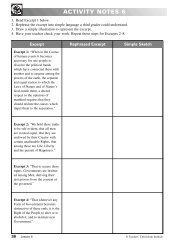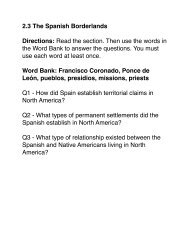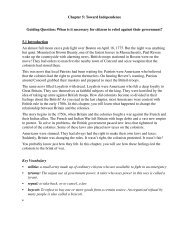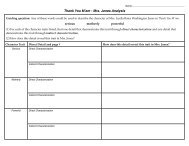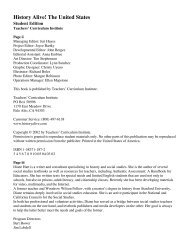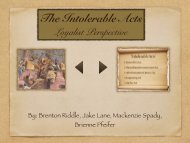Chapter 6: The Declaration of Independence Guiding Question ...
Chapter 6: The Declaration of Independence Guiding Question ...
Chapter 6: The Declaration of Independence Guiding Question ...
Create successful ePaper yourself
Turn your PDF publications into a flip-book with our unique Google optimized e-Paper software.
6.4 Toward <strong>Independence</strong><br />
Nearly a year passed between the skirmishes at Lexington and Concord and the British retreat<br />
from Boston. During that time, there was little talk <strong>of</strong> independence. Most colonists still<br />
considered themselves loyal British subjects. <strong>The</strong>ir quarrel was not with Great Britain itself, but<br />
with its policies toward the colonies.<br />
<strong>The</strong> Olive Branch Petition<br />
Many Americans pinned their hopes for peace on King George. In July 1775, Congress sent a<br />
petition to George III asking him to end the quarrel. John Adams called the petition an “olive<br />
branch,” because olive tree branches are an ancient symbol <strong>of</strong> peace.<br />
By the time the petition reached London, however, the king had declared the colonies to be in<br />
“open and avowed rebellion.” He ordered his ministers “to bring the traitors to justice.”<br />
Being called a traitor was enough to change the mind <strong>of</strong> one <strong>of</strong> Washington’s generals. <strong>The</strong><br />
general confessed that he had long “looked with some degree <strong>of</strong> horror on the scheme <strong>of</strong><br />
separation.” Now he agreed with Patrick Henry that “we must be independent or slaves.”<br />
Common Sense<br />
Many colonists, however, still looked with “horror” at the idea <strong>of</strong> independence. <strong>The</strong>n, early in<br />
1776, a Patriot named Thomas Paine published a fiery pamphlet entitled Common Sense. Paine<br />
sc<strong>of</strong>fed at the idea that Americans owed any loyalty to King George.<br />
“Of more worth is one honest man to society,” he wrote, “than all the crowned ruffians who ever<br />
lived.”<br />
Paine also attacked the argument that the colonies’ ties to Britain had benefited Americans. Just<br />
the opposite was true, he said. American trade had suffered under British control. Americans had<br />
also been hurt by being dragged into Britain’s European wars.<br />
Paine ended with a vision <strong>of</strong> an independent America as a homeland <strong>of</strong> liberty. “Ye that love<br />
mankind!” he urged. “Ye that dare oppose not only the tyranny, but the tyrant, stand forth!… <strong>The</strong><br />
sun never shined on a cause <strong>of</strong> greater worth.”<br />
Within a few months, more than 120,000 copies <strong>of</strong> Common Sense were printed. Paine’s<br />
arguments helped persuade thousands <strong>of</strong> colonists that independence was not only sensible, but<br />
the key to a brighter future.<br />
Fast Fact<br />
• Thomas Paine’s pamphlet Common Sense persuaded many colonists to support<br />
independence.



